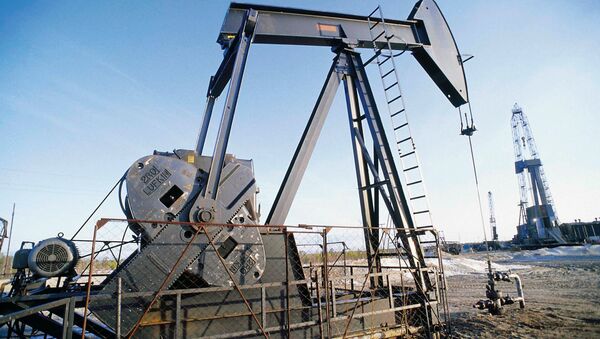Russian oil companies often prefer to develop deposits abroad rather than in Russia. Analysts believe this is not a good trend, as it cuts budget revenue and investment in infrastructure and new jobs at home. By developing oil fields abroad, Russian companies may receive higher profits, but risks for these projects in countries with unstable regimes can completely negate the potential benefits.
Iran drops Gazprom
On Monday, the National Iranian Oil Company (NIOC) said Iran had dropped Gazprom from the Azar oil field project due to the Russian energy giant's numerous "delays."
The Azar oil field is located in the Anaran block, which also includes the Changouleh oil field and has about eight billion barrels in oil reserves.
At first glance, the reason for this parting of ways with Gazprom is purely economic. Iran's Ambassador to Russia Seyyed Mahmoud Reza Sajjadi said last week that drafting the development contract for the Azar field, which contains about 270 million tons of oil (2 billion bbl), took two years. Gazprom has delayed the development of the Azar oilfield for nearly two years since signing a tentative agreement with the NIOC in 2009.
Last week, the Iranian authorities suggested that the Russian company cede its Azar development rights to another company. Representatives of Gazprom Neft, the oil producing unit of Gazprom, said they had not signed the contract because they could not get Iran to agree to be open to the possibility of reviewing its conditions. What in the current version of the document could possibly not suit the Russian company?
"The contract stipulates the provision of oilfield services," Vitaly Kryukov, an analyst with investment and financial group Kapital, told RIA Novosti. "Oil produced at the field remains the property of Iran, and the Russian company will only receive a fixed price for its services." The expert said that oil companies prefer developing foreign oil projects on the condition that there are production sharing agreements (PSA).
But there are also political considerations that are hindering this project: cooperation with a country against which international sanctions have been imposed could slow Gazprom Neft's foreign expansion, Kryukov said. There is indirect proof of this, in that Russia's LUKoil and Norway's Statoil, which conducted exploration at the Anaran block and negotiated the development of the deposits they discovered there, have not signed any contracts. LUKoil said it had pulled out of the project because of international sanctions but would resume its operation in Iran in a more favorable political situation.
Business only
Iran is not the only country where Russian companies are developing oil deposits. Konstantin Simonov, director of the National Energy Security Fund, said that Russian companies are implementing oil projects in a score of countries in Africa, Latin America, the Middle East and Central Asia.
What's the point of this, when Russia has about 11% of the world's explored oil reserves? But their interest seems strange only initially. Production costs abroad are several times less expensive than in Russia. "The cost of oil production in Iraq is often below $1, whereas the prime cost of West Siberian oil is $5-$12 per barrel," Simonov said.
Low production costs, combined with the government's tax policy according to which the mineral production tax may be raised 6.5% from 419 rubles ($14.50) per ton in 2012, mean that foreign projects are much more profitable than Russian ones.
"The profit rate at West Siberian oilfields which do not enjoy tax privileges is only sufficient to cover investment in development," Vitaly Kryukov said. "The profit rate in West Africa and at offshore SPA projects in Mexico and Brazil is at least 20%."
This explains why Russian companies undertake oil projects in countries with unstable or unpredictable regimes such as Libya, Venezuela, Algeria and Equatorial Guinea despite the high risks.
Repeating Soviet mistakes
Simonov believes that the examples of Iran and Libya, where Gazprom Neft halted work at oil concessions C96 and C97 and delayed plans to buy a 33% stake in Eni's Elephant field following the fall of the Gaddafi regime, demonstrate that such risks do not pay off. Moreover, Russian fields, even the difficult to access ones in East Siberia, can be as profitable as projects in Latin America or Africa if the government offers tax privileges. According to Kryukov, the profit rate at Rosneft's Vankor group of oil blocks in East Siberia is approximately 20%.
Konstantin Simonov believes that Russian oil companies, many of which are state controlled, take up foreign projects for both political and economic reasons. "The government wants to strengthen its influence in countries where Russian companies have investments," he said. "I think we are making the same mistakes as the Soviet Union did when it sought to strengthen its influence through massive injections of money which these countries now cannot repay."
The expert believes that it would be more profitable economically to cut duties in order to stimulate oil development in East Siberia. Budget revenues from these fields may be lower than those from West Siberian as a result of tax privileges and high production costs, but they will still be higher than those from the Iraqi and African projects. The capital that could be invested in the development of Russian regions and the creation of jobs there will instead go towards developing infrastructure and creating jobs in Africa, the Middle East and Latin America.
The views expressed in this article are the author's and may not necessarily represent those of RIA Novosti.

